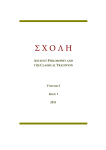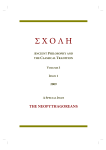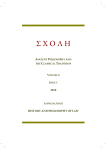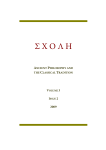Статьи журнала - Schole. Философское антиковедение и классическая традиция
Все статьи: 593
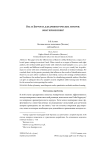
Delta Берроуза для древнегреческих авторов: опыт применения
Статья научная
В этой статье предпринята попытка эмпирически оценить эффективность метода измерения стилистической разницы, известного как Delta Берроуза, на материале древнегреческого корпуса. Эксперимент с корпусом из четырнадцати (и затем восьми) авторов подтвердил общую эффективность метода. Даже на небольших выборках в 1000–5000 слов решения Delta по большей части корректны, а ее ошибки связаны в основном с текстами, близкими в жанровом отношении. Именно жанровое сходство в обучающей выборке, а не количество слов или длина отрывка, оказывает наибольшее влияние на результат классификации. В спорных случаях, особенно если нет возможности использовать отрывки большей длины (10 000 слов и больше), составление шорт-листов предпочтительнее, чем назначение единственного кандидата. Подобные шорт-листы дают адекватное представление о ближайших стилистических соседях испытуемого текста, оставляя свободу исследователю в интерпретации результатов.
Бесплатно
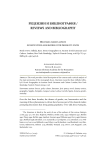
Discussing various aspects of erotic ethno-geographies of the Greek city-states
Рецензия
The work provides a brief description of the content and a critical analysis of the main provisions of the monograph by an American researcher Kate Gilhuly: Gilhuly K. Erotic Geographies in Ancient Greek Literature and Culture. London; New York: Routledge, Taylor & Francis Group, 2018.
Бесплатно

Discussions on the eternity of the world in antiquity and contemporary cosmology
Статья научная
This contribution continues the comparison between ancient and modern beliefs on scientific cosmology which began in a previous article in this Journal (ΣΧΟΛΗ 5.2 [2011]). I begin with a brief survey of contemporary theories on Big Bang cosmology, followed by a study of the cosmological theories of the Presocratic thinker Pherecydes of Syros. The second part of my paper studies the ramifications of the basic Platonic principle that bonum est diffusivum sui. I begin by studying the vicissitudes of this theory in the Patristic thought of Origen, the Arians, and Athanasius. Following Willy Theiler, I suggest that similarities between the views of Origen and the Neoplatonist philosopher Porphyry of Tyre may be traceable to Plotinus' teacher Ammonius Saccas. Finally, following Endress, I study the way the Arabic translation of some propositions from Proclus' Elements of Theology were accompanied by interpolated glosses derived from the Christian Neoplatonist John Philoponus, which were designed to make Proclus' thought more acceptable to a creationist, Monotheistic belief system such as Islam. Philoponus' theories of instantaneous creation were taken up, thanks to al-Kindi, by the Neoplatonica Arabica, whence they exerted an important influence on the development of Islamic thought. An Appendix of texts with translation and bibliography completes the article.
Бесплатно
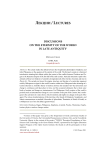
Discussions on the eternity of the world in late antiquity
Статья научная
This article studies the debate between the Neoplatonist philosophers Simplicius and John Philoponus on the question of the eternity of the world. The first part consists in a historical introduction situating their debate within the context of the conflict between Christians and Pagan in the Byzantine Empire of the first half of the sixth century. Particular attention is paid to the attitudes of these two thinkers to Aristotle's attempted proofs of the eternity of motion and time in Physics 8.1. The second part traces the origins, structure and function of a particular argument used by Philoponus to argue for the world's creation within time. Philoponus takes advantage of a tension inherent in Aristotle's theory of motion, between his standard view that all motion and change is continuous and takes place in time, and his occasional admission that at least some kinds of motion and change are instantaneous. For Philoponus, God's creation of the world is precisely such an instantaneous change: it is not a motion on the part of the Creator, but is analogous to the activation of a state (hexis), which is timeless and implies no change on the part of the agent. The various transformations of this doctrine at the hands of Peripatetic, Neoplatonic, and Islamic commentators are studied (Alexander of Aphrodisias, Themistius, al-Kindi, al-Farabi), as is Philoponus' use of it in his debate against Proclus.
Бесплатно
![Etymology of the nickname 'Iskarit(h): the “one who saw a sign” [('I)sqar(^i)'^o/yisqar(^i)'^o] or the “one who slandered/betrayed a sign” [('I)sqar(^i)'^o/yisqar(^i)'^o]? Etymology of the nickname 'Iskarit(h): the “one who saw a sign” [('I)sqar(^i)'^o/yisqar(^i)'^o] or the “one who slandered/betrayed a sign” [('I)sqar(^i)'^o/yisqar(^i)'^o]?](/file/thumb/147103397/etymology-of-the-nickname-iskarit-hthe-one-who-saw-a-sign-i-sqar-i.png)
Статья научная
The article derives Judas's nickname 'Iskariṓt(h) from the Hebrew/Aramaic verb sāqar/seqar, and the noun 'ōṯ/'ôṯ (widely used in Biblical Hebrew and attested in the Talmud [=Aramaic 't/'t']), and interprets it as the “one who saw/gaze upon a sign” (cf., e.g., John 2:23, 4:48, 6:2,14,30 mentioning those who «saw signs» and came to be Jesus's followers; the verbs theōréō and ‘oráō used in these passages correlate with the verb sāqar/seqar, “to look (at), gaze, see”, and the noun sēmeîon (pl. sēmeîa) correlates with the term 'ōṯ/'ôṯ, “sign”). The ex hypothesi “positive” character of Judas's nickname possibly explains the evangelists' renunciation of its interpretation. As an alternative etymology of Judas's nickname 'Iskariṓt(h), one can derive it from the Hebrew/Aramaic verb šāqar/šeqar (“to lie, deceive, slander”, sc. “to violate (a treaty, etc.)”, “to betray” [the latter meaning is attested in Samaritan Aramaic]) and the same noun 'ōṯ/'ôṯ: the “one who slandered/resp. betrayed a sign”, i.e. the one who brought false evidence against Jesus (сf.: Matt. 26:59 ff.; Mk. 14:55 ff.). In Jn. 6:70, Jesus himself defines Judas with the term diábolos; this word can be interpreted as “slanderer”, “accuser”.
Бесплатно
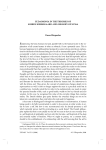
Eudamonia in the theories of Soren Kierkegaard and Gregory of Nyssa
Статья научная
Panos Eliopoulos (University of Athens) carries out a comparative analysis of the concept of happiness of two Christian philosophers who lived at different times and in different cultural traditions, Søren Kierkegaard and Gregory of Nyssa.
Бесплатно
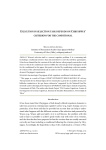
Execution in selection task depends on Chrysippus’ criterion for the conditional
Статья научная
Wason’s selection task is a current cognitive problem. It is a reasoning task including a conditional sentence that only sometimes is correctly solved by participants. It has been claimed that the versions of the task that are often properly executed are only those in which the conditional sentence fulfills the criterion given by Chrysippus of Soli for the conditional. In this paper, this point is checked by considering a relevant number of versions of the aforementioned task in order to review whether or not their conditionals meet Chrysippus’ requirement.
Бесплатно
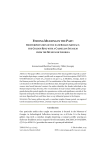
Статья научная
This paper offers a novel interpretation of the luxury golden ring with a carnelian intaglio depicting a woman's profile and an engraved Greek inscription, ΒΑCIΛICCΑ ΟΥΛΠIAΝΑ(Ζ)IA (or AΣIA E.A.), found in cist grave 14, in Mtskheta, Georgia, dated to the Roman period, the 3rd century AD. In consideration of the then contemporary political situation in the Mediterranean and Roman East, through the putting and interpreting sources into broad historical context, the author identifies the female individual as the Roman Empress Ulpia Severina. The very inclusion of royal woman within public propaganda during this period signifies her prominence within, and significance outside of, the imperial metropolis. This deliberate inclusion proved to the public that this empress was not mere figurehead but could have been a very influential person in the Empire.
Бесплатно
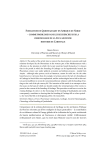
Статья научная
L'auteur de l'article tente de relier l'observation des relations économiques et commerciales développées par les Phéniciens dans la partie occidentale de la Méditerranée à une réflexion sur la situation dans laquelle se trouvaient les pays du Levant. On sait qu'à l'époque où la fondation de Carthage peut être hypothétiquement localisée, les centres phéniciens étaient sous pression politique, économique et militaire - principalement de l'Assyrie - bien que d'autres puissances, comme Damas, ne puissent être exclues. D'autre part, cependant, on sait que, par exemple, dans la science allemande l'absence d'acte fondateur de Carthage en Afrique du Nord a été soulignée, et les traces archéologiques laissées sur ce territoire semblent insuffisantes pour concilier les relations littéraires conventionnelles avec l'acte fondateur. de Carthage à la fin du IXe siècle av. L'intention de cet article est de tenter de montrer les enjeux à partir desquels il convient d'envisager la réinterprétation des événements rapportés dans le contexte de la fondation de Carthage. Cette démarche servirait à réviser les connaissances scientifiques existantes sur la chronologie de la fondation de Qarthadasht et pourrait, par conséquent, contribuer à montrer que la fondation de Carthage s'inscrit dans une période postérieure - c'est-à-dire la fin du VIIIe ou le début du VIIe. siècle avant notre ère.
Бесплатно
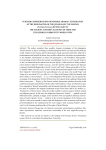
Статья научная
The author considers three possible Aramaic etymologies of the designation Ἐσσαῖοι/Ἐσσηνοί: (1) Since, according to reiterated Josephus Flavius' accounts and the Dead Sea scrolls' evidences, the Essenes and the Qumranites, closely associated with them, believed in predestination and foretold the future, they could be called: those, who believe in predestination, sc. the “fatalists”, “determinists”; or: those, who predict fate, i.e. the “foretellers”. This hypothetical etymology is derived from the Aramaic word ḥaššayyā᾿ (m. pl. in st. det.; resp. ḥš(᾿)(y)yn in st. abs.) reconstructed by the author from the term ḥšy/ḥš᾿ (“what man has to suffer, predestination, fortune”) after the model: C1aC2C2aC3. (2) In the present author's opinion, the Qumran community held itself allegorically to be the “root(s)” and “stock” of Jesse, giving life to the “holy" Davidic “Shoot” (see: Isa. 11:1); or, in other words, the Qumranites appear to have considered their Yaḥaḏ (lit. “Unity/Oneness”) the personification of a new Jesse, who would “beget” and “bring up” a new David. (Cf., e.g., 1QSa, II, 11-12: “When [God] begets (yôlîḏ) the Messiah with them (᾿ittām; i.e. the sectarians. - I. T.)...”.) Proceeding from this doctrine, one can assume the etymology of the designation Ἐσσαῖοι/Ἐσσηνοί from the Aramaic-Syriac spelling of King David father's name Jesse - ᾿Κ(š)ay. (3) The Essenes' and the Qumranites' aloofness from this world and their striving for interrelations with the other world could be a reason, by which they came to be regarded as “liminal” personalities and nicknamed (probably, with a tinge of irony) after the name of “rephaites” (the original vocalization seems to have been: rōfĕ᾿îm, lit. “healers”, sc. “benefactors”) of former times, whom they really recalled in some key aspects of their outlook and religious practice. In this case, the designation θεραπευταί, “healers”, - applied in Jewish Hellenized circles, primarily, in Egypt, to the members of the (ex hypothesi) Essenean communities of mystic-“gnostic” trend - could be in fact a Greek translation of the Hebrew term rōfĕ᾿îm. It also seems natural to assume that this designation of the sectarians could be interpreted/translated by the uninitiated by the word ᾿āsayyā᾿/᾿āsên, meaning “healers”, “physicians”, in the Aramaic-speaking milieu of the region of Syria-Palestine.
Бесплатно
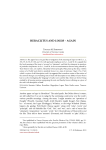
Статья научная
The paper has as its goal the investigation of the meaning of logos in DK frs. 1, 2, 31b, 39, 45, 50, 87, 108, and 115, with particular emphasis on frs. 1, 2 and 50. It is argued that the focal meaning of the term is ‘account’ or ‘statement’, and that the statement in question, of particular importance in frs 1, 2 and 50, it the account/statement forever being uttered by ‘that which is wise’, ( to sophon ), Heraclitus’ divine principle. Plato picks up the idea, with his notion of a World Soul which is similarly forever in a state of utterance (‘ legei ’, Tim. 37ab) which is a piece of self-description, and it is suggested that a modern version of the notion of the universe being in an everlasting state of such self-description is our ability to learn what it has to say by investigating the ‘language’ of radio waves and the like, which are forever being emitted by all moving systems composing the real, and thereby forever offering us a piece of the real’s self-description of itself.
Бесплатно
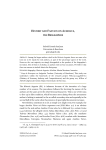
History and Fantasy on Acholius, the Biographer
Статья научная
Among the bogus authors cited in the Historia Augusta, there are some who turn out to be masks for real authors, as part of the picaresque aspect of the work. However, the vast majority are simply disregarded as the product of the biographer’s invention. One of them is Acholius, an author cited on four occasions. We believe that there are reasons to include him in the first group.
Бесплатно
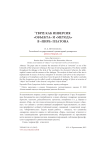
Hybris как инверсия «объекта» и «метода» в «Пире» Платона
Статья научная
Задача работы - показать, что одним из лейтмотивов «Пира» является семантика гюбриса как «инверсии», которая относится к теме взаимодействия противоположностей, обыгрываемой на протяжении всего диалога на уровне лексики, поведения персонажей, собственно философского содержания и самой композиции диалога. Как инструмент анализа этих уровней текста используются ключевые метафоры инверсии и гюбриса в «Пире» - андрогины из речи Аристофана и силены из речи Алкивиада. Делается вывод, что в целом «Пир» можно назвать апологией философского гюбриса как инверсии «объекта» и «метода» в форме своеобразной «сатировой драмы».
Бесплатно



